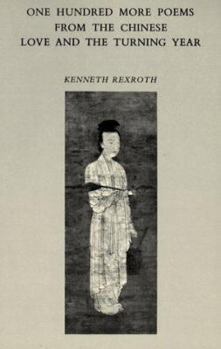One Hundred More Poems from the Chinese: Love and the Turning Year
Select Format
Select Condition 
Book Overview
Love and the Turning Year includes a selection from the Yueh Fu--folk songs from the Six Dynasties Period (fourth-fifth centuries A.D.). Most of the songs are simple, erotic lyrics. Some are attributed to legendary courtesans, while others may have been sung at harvest festivals or marriage celebrations. In addition to the folk songs, Rexroth offers a wide sampling of Chinese verse: works by 60 different poets, from the third century to our own time...
Format:Paperback
Language:English
ISBN:0811201791
ISBN13:9780811201797
Release Date:January 1970
Publisher:New Directions Publishing Corporation
Length:142 Pages
Weight:0.40 lbs.
Dimensions:0.5" x 5.2" x 8.0"
Customer Reviews
4 ratings
Brilliant poetry, in any language
Published by Thriftbooks.com User , 15 years ago
Open the book anywhere, and the poem works for you! This is a tremendous achievement. Eliot Weinberger has called it "possibly his best translation". Much of it works of course, because of the novelty of the imagery, e.g. this poem by T'ien Hung: The dew on the garlic Is gone soon after sunrise. The dew that evaporated this morning Will descend again in tomorrow's dawn. Man dies and is gone, And when has anybody ever come back? But to my mind, a question lingers over the authenticity of the "ttranslation" - are these really reflecting the author's voice, or are they transcreations as in Ezra Pound? While Rexroth certainly knew some Chinese, mostly his sources are other translations, including German and French (see http://www.cse.iitk.ac.in/~amit/books/rexroth-1970-one-hundred-more.html). Authenticity is especially problematic because at one point, Rexroth composed the "The love poems of Marichiko", poems he claimed were translated from the work of a young Japanese woman. He has clearly captured the oriental spirit, but still the question lingers. In general, the verisimilitude of translations from Chinese (or other non-European languages) rarely match that of Dante or Homer, say. But whether they are translations or transcreations, they stand on their own as superb poetry.
A beautiful but weaker collection...
Published by Thriftbooks.com User , 18 years ago
I loved "One Hundred Poems from the Chinese" by Mr. Rexroth, and I thought then of course, I would want "More". And it is a very lovely collection of poems, tho I feel the stronger poems and poets were covered in the first book. The poems in "More" are very good, just not at the par of the first one.
An Authority on the subject
Published by Thriftbooks.com User , 25 years ago
Rexroth was first introduced to me by my high school teacher while we were studying Chinese literature. At first, I couldn't quite understand what was so great about Chinese poems, why Li Po and Tu Fu, and many others are so greatly admired. After this, I've come to a much better understanding of Chinese literature in general, and a much greater love for it. I recommend this book to anyone.
Well, actually, this is CHINESE poetry.
Published by Thriftbooks.com User , 26 years ago
Well, actually, this is CHINESE poetry. Really excellent translation. Rexroth was a great American poet, and ground breaker as a translator of both Chinese and Japanese poetry, and all his work is still worth reading.





